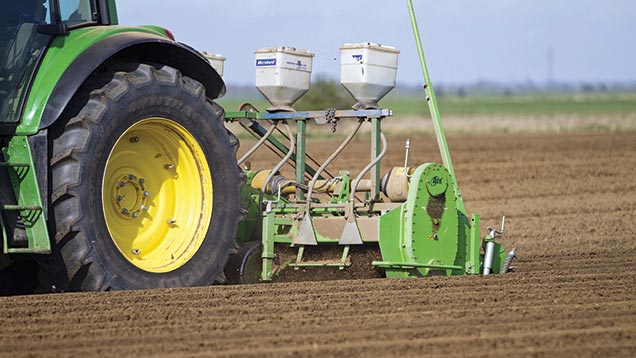Nematicide stewardship programme gets go-ahead
 © Gary Naylor
© Gary Naylor A new stewardship group has been launched to help potato growers carry out best practice for all granular nematicide applications.
Nematicides are a vital tool for potato growers in tackling potato cyst nematodes (PCN), which are the biggest pest threat to the UK potato industry costing in excess of £50m annually.
See also: 10 top tips to improve your potato business in 2015
Tightening legislation, a dwindling conventional chemistry set and a lack of resistant varieties are making it more challenging for growers to control and has put more emphasis on maintaining the current armoury against the pest.
PCN is currently present is about two-thirds of potato-growing land in the UK and there are limited nematicide options left, including Nemathorin (fosthiazate), Vydate (oxamyl) and Mocap (ethoprophos).
The newly formed nematicide stewardship programme (NSP) will deliver vital support to the industry to ensure these crucial products remain available for future use on potatoes and other key crops.
The joint initiative brings together agrochemical companies Certis, DuPont and Syngenta, setting minimum stewardship standards for application of all nematicides.
Neil Beadle of DuPont explains the new launch would help bring the industry together and ensure farmers, contractors and farmworkers were up to speed with the correct way to both handle and apply the chemicals.
“It is vital that we use every opportunity to ensure that products are used responsibly, cost-efficiently and in accordance with the manufacturers’ recommendations,” explains Mr Beadle.
The launch sees a new user protocol to follow, which is being incorporated into the Red Tractor Assurance scheme, a series of workshops aimed at educating users and a tractor cab sticker warning users to stop three metres before reaching the row end.
The NSP will be running a series of free half-day training courses this spring and again next autumn to help operators ensure they are fully up to date with the latest legislation and are supplied with the correct information on applying nematicide products accurately and safely.
“We’ll be encouraging all of the 1,000-plus operators to attend these workshops, and keeping accurate records so that we can reach out to everyone applying these products,” he says.
Mr Beadle points out the plan will span over three years to allow growers time to take the relevant training and implement various measures on their farm.
This includes, by March 2017, that staff applying nematicides must have completed the Industry Stewardship Training module and all applicators must be fitted with a device in-cab that allows the operator to shut off nematicide granule flow at least three metres from the end of each row.
Growers must show the granule applicator has been calibrated and checked by a qualified engineer within the past two years.
Ian Forman, from national sprayer testing scheme, explains growers can expect to pay roughly £150-250 to have their machines tested and ensure they are meeting the correct protocols.
“We want to make sure the equipment satisfies crop assurance, supermarket protocols and promotes best practice,” he says.
Biennial testing of granule applicators along with a calibration will also be included in the programme.
Jo Allen, of Horstine, which manufacture nematicide applicators, says much of the equipment on farm already meets the requirements but it will be a case of ensuring people know the correct protocols
However, he explains that accurate applications are crucial so upgrading older equipment or investing in new equipment will be important to follow the programme.
Mike Storey, of the Potato Council, says the NSP represents a positive move for the industry and will be crucial in helping the potato industry manage one of the biggest threats effectively and responsibly.
“It is providing a great umbrella to move the industry forward on management of PCN and will help ensure some of the most important tools are still available to us,” he says.
What the new protocol involves
- Growers must demonstrate that advice has been sought from a Basis-qualified agronomist prior to the purchase and use of a nematicide. Recommendation sheets should be available for each treated field.
- Operators must be qualified to apply granular nematicides (NPTC PA4 or PA4G certification). By March 2017, staff applying nematicides must have completed the Industry Stewardship Training module.
- Growers must demonstrate the granule applicator has been calibrated and checked by a qualified engineer within the past two years.
- Cassettes and cartridges (including appropriate rotors) must be appropriate for the accurate application of nematicides.
- When applying nematicide, growers should keep records to demonstrate that:
1. The applicator is checked prior to each work day, ensuring all pipework is correctly fitted, the hopper bungs are in place and the hopper lids are secure.
2. The applicator is calibrated each week.
3.The area treated and the product volume used match for each field.

